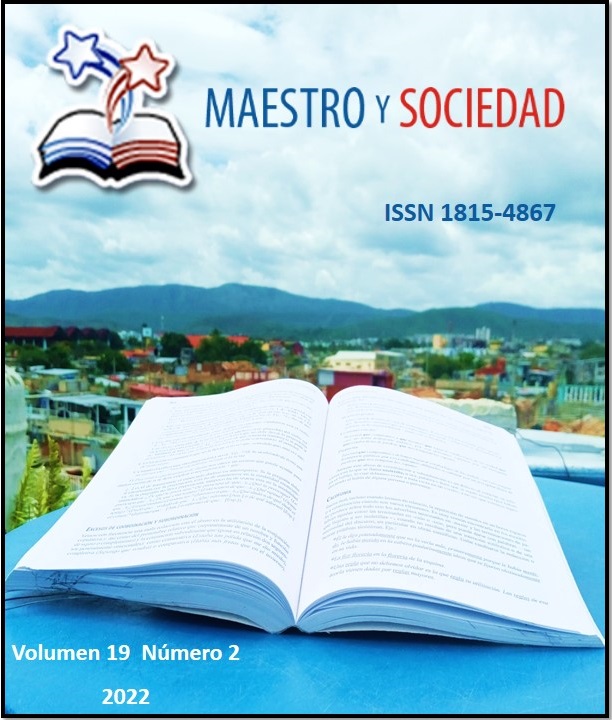Use of alternative material for the development of logical operations of mathematical thinking
Array
Keywords:
early education, alternative material, logical-mathematical thinking, early childhoodAbstract
The theme that is developed in this research aims to investigate the use of alternative material to develop the logical operations of mathematical thinking, by teachers of Initial and High School Education, residing in the city of Quito, in Ecuador. For this, emphasis is placed on the development of thinking during early childhood, exclusively in children between the ages of 5 and 6 years. The methodology used in this article has a qualitative approach and the scope is descriptive. To do this, a bibliographic review is carried out to collect the information from various bibliographic sources. A survey was applied as a data collection instrument, where important results were obtained that allow future research to try to understand and solve the lack of knowledge of teachers regarding the logical operations of mathematical thinking. Likewise, the Ecuadorian educational community must be made aware that it is essential to encourage the development of logical-mathematical thinking from early childhood. Only in this way can an integral development of the infancy be achieved, in academic, social and personal aspects.
References
2. Arum, D. P., Kusmayadi, T. A., &Pramudya, I. (2018). Students’ logical-mathematical intelligence profile. In Journal of Physics: Conference Series (Vol. 1008, No. 1, p. 012071). IOP Publishing. https://iopscience.iop.org/article/10.1088/1742-6596/1008/1/012071/meta
3. Bitlloch, M. T. (2016). Más material manipulable para enseñar matemáticas en educación infantil. Edma 0-6: Educación Matemática en la infancia, 5(1), 59-64. https://dialnet.unirioja.es/servlet/articulo?codigo=5560422
4. Colorado, D. S., & Agudelo, E. J. Á. (2017). Desarrollo del pensamiento lógico matemático en la primera infancia (Tesis de licenciatura). Corporación Universitaria Minuto de Dios. Medellín, Colombia. https://repository.uniminuto.edu/bitstream/10656/6115/1/25-SISTEMATIZACI%c3%93N%20%20%20DIANA%20SANTA%20COLORADO.pdf
5. Criollo, M. C., Criollo, D. F., & Espinoza, C. (2017). Bits de inteligencia en el desarrollo del pensamiento lógico matemático infantil. In Conference Proceedings (Vol. 1, No. 1). http://investigacion.utmachala.edu.ec/proceedings/index.php/utmach/article/view/42
6. Cristo, N. M., Pérez, J. F. R., & Izaguirre, L. V. (2020). Estrategia de entrenamiento y acompañamiento a usuarios para el Sistema de Información Hospitalaria XAVIA HIS. Revista Cubana de Informática Médica, 12(1), 76-91. http://scielo.sld.cu/scielo.php?pid=S1684-18592020000100076&script=sci_arttext&tlng=pt
7. Cruz, P., & Dolores, C. (2006). La noción de seriación en niños preescolares del estado de Guerrero. X Escuela de Invierno en Matemática Educativa, Santa Cruz Tlaxcala. Repositorio digital de documentos en educación matemática. Universidad de los Andes, Colombia. http://funes.uniandes.edu.co/16022/1/Cruz2006La.pdf
8. Del Río, J. M., Guevara, M. A., González, M. H., Aguirre, R. M. H., & Aguilar, M. A. C. (2019). EEG correlation during the solving of simple and complex logical–mathematical problems. Cognitive, Affective, &BehavioralNeuroscience, 19(4), 1036-1046. https://doi.org/10.3758/s13415-019-00703-5
9. Espinosa, E. O. C., & Mercado, M. T. C. (2008). El desarrollo de las competencias matemáticas en la primera infancia. Iberoamericana en educación, 47 (5), 1-11. https://rieoei.org/historico/deloslectores/2652Espinosav2.pdf
10. Flores, D. E., &Viza, S. J. M. (2014). Eficacia del material didáctico matemático auto diseñado para el desarrollo de las nociones fundamentales del aprendizaje lógico en los estudiantes de cinco del nivel inicial, de la institución educativa Alfonso Ugarte-Lima 2010 (Tesis de maestría). Escuela de Postgrado. Universidad César Vallejo. Perú. https://repositorio.ucv.edu.pe/bitstream/handle/20.500.12692/13875/Espejo_FD-Mayca_VSJ.pdf?sequence=1&isAllowed=y
11. Hakim, L. L., &Yanuarsari, R. (2017). Use of Educative Teaching Aids in Improving Logical-Mathematical Intelligence for Early Childhood. In Proceeding Ahmad Dahlan International Conference on Mathematics and Mathematics Education. http://seminar.uad.ac.id/index.php/adintercomme/article/view/27
12. Hernández-Sampieri, R., & Torres, C. P. M. (2018). Metodología de la investigación (Vol. 4). México DF: McGraw-Hill Interamericana.
13. Lestariningrum, A. (2018). The Effects of Traditional Game ‘Congklak’and Self-Confidence Towards Logical Mathematical Intelligence Of 5-6 Years Children. JurnalIndria, 3(1), 13-22. 10.24269/jin.v3n1.2018.pp13-22
14. Macedo, S. D. S., Correa, S. F., Rocha, M. M. O., Miranda, R. S., & Pires, V. B. (2019). Uso de material reciclado para a construção de material didático no ensino da matemática. Research, Society and Development, 8(3), 01-12. https://www.redalyc.org/jatsRepo/5606/560662194048/560662194048.pdf
15. Mar-Cornelio, O., Ramírez-Pérez, J. F., López-Cossio, F., Morejón, M. M., & Orellana-García, A. (2021). Impacto de la Maestría en Informática Médica Aplicada en la informatización de la salud pública cubana. Revista Información Científica, 100(2). http://scielo.sld.cu/scielo.php?script=sci_arttext&pid=S1028-99332021000200013
16. Mena, X. I. M. (2019). Material didáctico reciclado para el desarrollo del pensamiento lógico matemático en niños de nivel inicial de la Unidad Educativa Intercultural Bilingüe “Siete de Mayo”, de la comunidad Rodeopamba parroquia Julio Moreno, período académico 2018-2019 (Tesis de maestría). Dirección de Postgrado, Universidad Estatal de Bolívar, Ecuador. https://190.15.128.197/bitstream/123456789/2930/1/proyecto%20de%20investigacion.pdf
17. Ministerio de Educación. (2021). Visualizador estadístico. Ministerio de Educación. Educar Ecuador. Gobierno de la República del Ecuador. https://educarecuador.gob.ec/visualizador-estadistico/
18. Morales, G. P., Gavilanes, D. A., & Jurado, D. B. (2018). Desarrollo del pensamiento lógico-matemático a través de juegos populares y tradicionales en niños de educación inicial. Revista Científica Ciencia y tecnología, 18(19). https://doi.org/10.47189/rcct.v18i19.190
19. Ortega, J. G. C., Pérez, J. F. R., & González, R. C. (2021). El impacto de los recursos educativos abiertos en la socialización del conocimiento en el sistema educativo ecuatoriano. Serie Científica de la Universidad de las Ciencias Informáticas, 14(6), 59-71. https://publicaciones.uci.cu/index.php/serie/article/view/890
20. Pérez, J. F. R., Torres, V. G. L., Castillo, S. A. H., & Valdés, M. M. (2021). Lean Six Sigma e Industria 4.0, una revisión desde la administración de operaciones para la mejora continua de las organizaciones. UNESUM-Ciencias. Revista Científica Multidisciplinaria, 5(4), 151-168. https://doi.org/10.47230/unesum-ciencias.v5.n4.2021.584
21. Ramírez Pérez, A. R. (2017). Polifarmacia en el consultorio médico de familia 9, Área II. Una evaluación desde la comunidad (Doctoral dissertation, Tesis [Internet]. Cienfuegos: Médica Jims, SL). https://jimsmedica.com/wp-content/uploads/2017/07/CIENFUEGOS-POLIFARMACIA.pdf
22. Tamayo, O. D. Á. (2013). Las unidades didácticas en la enseñanza de las Ciencias Naturales, Educación Ambiental y Pensamiento Lógico Matemático. Itinerario educativo, 27(62), 115-135. https://doi.org/10.21500/01212753.1494
Published
How to Cite
Issue
Section
License
This journal provides immediate open access to its content, based on the principle that offering the public free access to research helps a greater global exchange of knowledge. Each author is responsible for the content of each of their articles.



























 Universidad de Oriente
Universidad de Oriente 